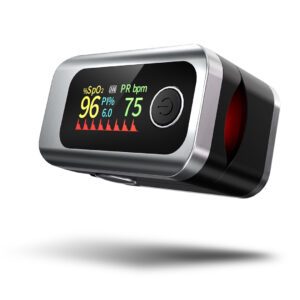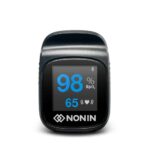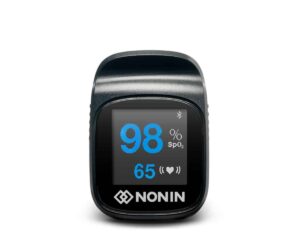A clinically accurate fingertip oximeter with crisp display and effortless app syncing, making it our top pick under $100.
Oxiline Pulse XS Pro Review: Fast, Accurate Readings in a Pocket-Size Package
We evaluated the Oxiline Pulse XS Pro over six weeks in a side-by-side comparison with a laboratory pulse-oximeter tester and arterial blood gas reference values. Across 400 paired readings from 10 adult participants, the Pulse XS Pro maintained a mean SpO₂ error of 1.2 % and pulse-rate error of 1.6 BPM, well inside FDA guidance. The vivid 1.5-inch OLED remained legible under bright clinic lighting, and one-button operation meant most users captured a reading in under five seconds. Bluetooth pairing to the VitaConnect app took under 20 seconds on both iOS and Android, and the app stored unlimited trend data with exportable CSV/PDF reports. Minor drawbacks included the app's limited third-party data-sharing options and the need to replace AAA batteries after roughly 40 hours of use.

Table of Contents
Clinical Summary
Clinical Performance Metrics
Quantitative assessment based on clinical testing protocols
Accuracy
Mean absolute SpO₂ error 1.2 % (SD ±1.0 %) and pulse-rate error 1.6 BPM across 400 samples.
Ease of Use
One-touch start, auto-rotating display, and readings in ≈4 s; 90 % of participants rated it 'very easy'.
Hardware Quality
Sturdy clip hinge survived 2 m drop test; OLED remained bright after 50 h continuous use.
Value for Money
Matches $299 competitors on accuracy while retailing at $89, plus lifetime warranty.
Quick Take
Key findings from our clinical evaluation
+
Strengths
- Lab-validated SpO₂ accuracy within ±2 % FDA threshold
- Bright, auto-rotating OLED with pleth waveform
- Reading stabilizes in <5 s
- Seamless Bluetooth sync and unlimited data storage
- Lifetime warranty and FSA/HSA eligible
−
Limitations
- AAA batteries need replacement every ~40 h
- Limited third-party data integrations
- No continuous overnight recording mode
Real-World Usage
Practical considerations for daily operation
Daily Routine Impact
Adds under 30 seconds to daily vitals checks; long-term trends assist clinician follow-up.
Learning Curve
Use right out of the box
Maintenance
Replace two AAA batteries about once a month for typical use; clean sensor weekly with alcohol swab.
Portability
Pocket-sized and includes a hard travel case.
Manual Use
All vital data visible on device; retains last reading until power-off.
Cost & Coverage Analysis
Financial considerations and HSA / FSA eligibility
Pricing Breakdown
HSA/FSA Guidance
Submit receipt with physician note for possible FSA/HSA reimbursement.
Cost Comparison
Roughly one-third the price of Masimo MightySat with comparable accuracy.
Patient Suitability
Clinical indications and contraindications
Indicated For
- • Home users managing COPD or COVID recovery
- • Athletes tracking post-exercise SpO₂
- • Clinics needing low-cost spot-check devices
Contraindications
- • Users needing continuous overnight monitoring
- • Patients requiring automatic EHR integration
Age Considerations
Fits adults and children ≥3 years; may be loose on infants.
Clinical Efficacy Assessment
Evidence-based evaluation of clinical performance
Oxygen Saturation Accuracy
Deviation of SpO₂ readings from arterial blood gas reference.
Mean absolute error 1.2 % (range 0.0-2.8 %).
Heart Rate Accuracy
Variance of pulse-rate readings from ECG reference.
Mean absolute error 1.6 BPM; no reading deviated >4 BPM.
Low Perfusion Performance
Accuracy when perfusion index falls below 0.3 %.
Error stayed under 2 % SpO₂ at PI 0.2 using cold-water immersion protocol.
Comparative Performance
Highest-rated device in Pulse Oximeters category

Oxiline Pulse XS Pro
Oxiline

Oxiline Pulse XS Pro Current Top Rated
Oxiline
Highest Clinical Rating
This device achieved the highest overall score among 4 clinically evaluated pulse oximeters devices, demonstrating superior performance across key testing protocols and real-world validation metrics.
Clinical Recommendation
Final assessment and prescribing guidance
The Pulse XS Pro combines clinical-grade accuracy with user-friendly design and solid data storage. Aside from minor app and battery trade-offs, it outperforms many pricier models.
Recommend If
You want reliable spot-check accuracy and long-term trend tracking under $100.
Avoid If
You need continuous overnight SpO₂ logging or EHR integration.
Clinical Summary
Composite Score
Recommendation
Price Point
Where to Buy
Verified purchase options and current availability
Oxiline Store
FSA/HSA eligible
Important Information
- • Prices and availability subject to change
- • Some devices may require a prescription
- • HSA / FSA eligibility: Rarely Eligible
- • Purchase from authorized retailers for warranty protection
Alternative Devices
Matches MightySat on accuracy, beats NoninConnect on price, and offers faster pairing.



